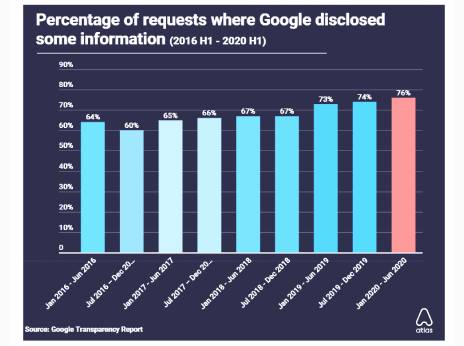
February 18 2021: Google has reported a record number of requests to disclose user information in the first half of 2020.
(From a blog dated February 16 Edward G. Cybersecurity Researcher and Publisher at Atlas VPN.)
For civil, administrative, criminal, and national security purposes, a range of laws enables government agencies worldwide to request user information from Google.
Recent findings by Atlas VPN reveal that these requests have been steadily growing in the past five years. In the first half of 2020, Google reported a record number of applications for the disclosure of user information.
The number of requests grew by 17,847, comparing the first half of 2020 to the second half of 2019, representing a 21% increase. Moreover, the number of internet users affected by these requests jumped from 175,712 in 2019 H2 to 235,449 in 2020 H1, amounting to a 34% surge.Figures dating back to 2016 reveal that in less than five years, the number of requests for internaut information shot up 2.31 times.
These days, when more and more people are active on the internet due to lockdowns, the requests for information do not instill confidence in the fact that the government cares about their citizens' privacy.
Google tracks a lot of critical data about its users, like location history, emails, and search history. Meaning, government agencies can retrieve this information after submitting an official request. Worth noting, Google began charging law enforcement agencies $45 for a subpoena, $60 for a wire trap, and $245 for a search warrant, since the start of 2020.
Google approves 76% of requests
Not only is the number of requests growing, but Google continues to approve a higher percentage of these requests continuously since the second half of 2016. In the “Requests for user information FAQs” Google states that they always try to negotiate with the agencies to provide as little information as possible. However, the truth is that users do not know how hard the tech giant fights to protect this sensitive data. The search engine approved 76% of requests for the disclosure of their user information in the first half of 2020. One of the most sensitive provisions of information is known as “geofence searches”. Here, law enforcement requests for Google to provide its users’ location data that is stored in an enormous database called Sensorvault. Government agencies use this location data from hundreds of devices to find suspects and witnesses.
Another sensitive request of information is called a “keyword warrant”. Here, the court orders Google to provide a database of people who searched for a specific term in their search engine.
Driven by domestic security interests, private enterprise, and new technologies, national governments are increasingly expanding the amount of digital data they collect about their citizens.
Worldwide, almost all governments are increasing their attempts to collect and access data by tracking private citizens, seeking permission to use corporate-collected data, or collecting foreign government information.
With the increase of internet usage due to the pandemic, the current state of users' privacy is troubling.
Says Rachel Welch, COO of Atlas VPN:“Worldwide, almost all governments are increasing their attempts to collect and access data by tracking private citizens, seeking permission to use corporate-collected data, or collecting foreign government information.With the increase of internet usage due to the pandemic, the current state of users privacy is tremendously troubling.”
________________________________________________________________________
From Google Transparency Report by country: India
“We received multiple requests from Indian law enforcement for 173 YouTube URLs
depicting content related to COVID-19. The reported content ranged from conspiracy
theories and religious hate speech related to COVID-19 to news reports and criticism
of the authorities' handling of the pandemic.”
---------------------------------------------------------------------------------------------------------------------------
India’s info requests to Twitter increased by 451% reports Times of India .
Between Jan-June 2020 and Jan-June 2019, India's request to remove information and account to Twitter, and legal information requests to Facebook shot up exponentially. The number of hours lost to internet blackout also jumped for the same period. India's request to Twitter to reveal who operates a specific account spiked by 451%.
The government made 2,613 such requests regarding 6,346 accounts, out of which Twitter compiled with just 1% requests. According to statistics provided by the microblogging site, account removal request also saw a 450% hike. India has made 55,000 account removal requests since 2012, out of which Twitter compiled with 18.8 per cent